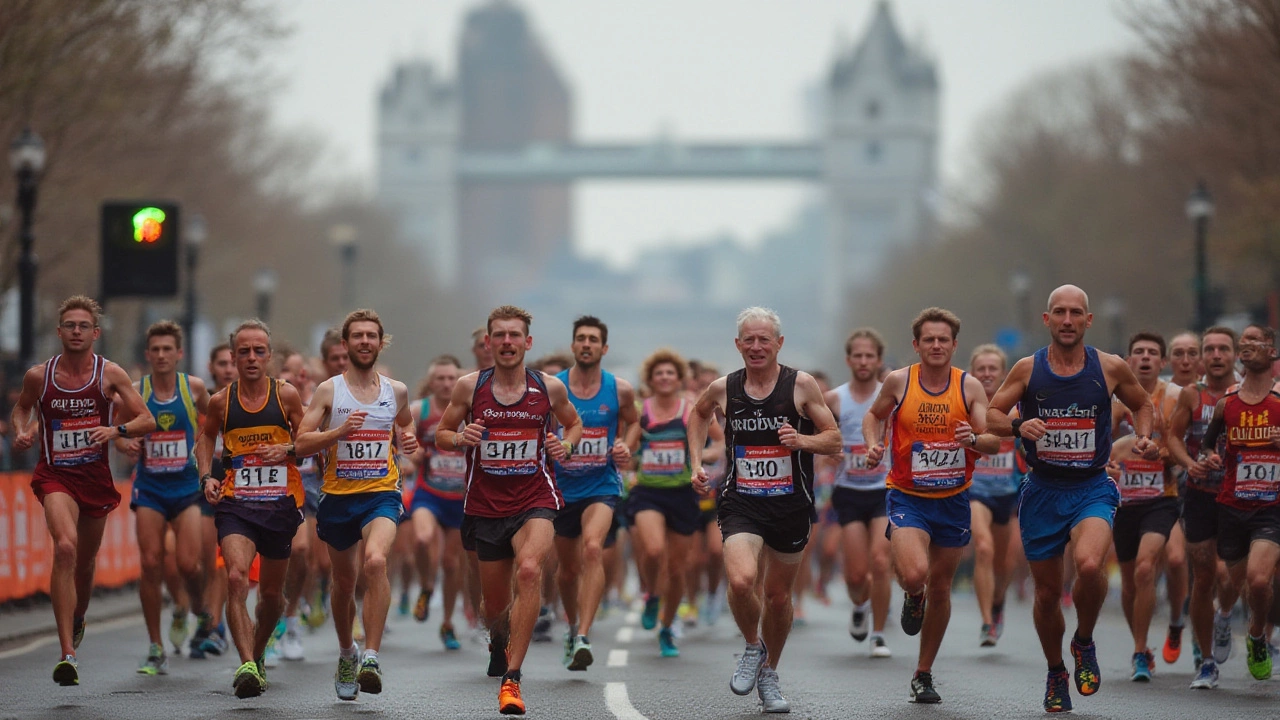Is 4 Hours a Good Marathon Time? Explaining What a Fast Marathon Really Means

Picture this: you cross the finish line, clock stops at 3:59:48, and for a moment, you’re not sure whether to laugh, cry, or collapse. There’s this odd mix of pride and disbelief brewing inside your barley-fuelled legs. And yet, right away, some well-meaning mate pipes up, “So, is 4 hours a fast marathon?” If you’ve trained for months through rain, blisters, and endless early mornings, you’re definitely hoping the answer is yes. But what does the clock really say about you as a marathoner at 4 hours?
What Does "Fast" Mean in the Marathon World?
The word “fast” messes with us. In marathons, it’s sneaky, totally subjective, and loaded with stinky cheese. For someone tackling their very first 26.2 miles, just finishing can feel like a gold-medal moment. For the elites—think Kenyan legends like Eliud Kipchoge, who literally did it in under two hours—4 hours looks like a slow jog. But let’s ignore outliers and talk numbers we can relate to.
If you scan the latest stats, the average marathon finish time worldwide sits right around 4 hours and 30 minutes. In the UK, it’s actually a bit higher—about 4 hours 37 minutes for men, 5 hours for women, according to 2024 data from RunSignup and Marastats. So, if you’ve breached the 4-hour barrier, you’re already quicker than most runners lacing up their trainers on race day. The percent of marathoners finishing under four hours hovers near 25-30% at big-city races like London or Berlin, dropping lower in more local or beginner-focused events.
Elite runners, those who make headlines, do marathons in under 2:10 (men) or 2:25 (women). For context, the men’s world record is 2:00:35. But let’s snap back to real life: the lion’s share of runners out there slog away for anywhere between four and six hours. Put bluntly, breaking the four-hour mark puts you in the top tier for recreational marathoners. It’s not “elite,” but it sure isn’t “slow.”
If you want to know exactly where you land, some marathons publish finish time distributions post-race. For example, at the 2023 London Marathon, out of over 48,000 finishers, about 11,800 crossed under four hours, which puts you in the top quarter. That’s a pretty nice feeling when you’re wobbling to grab your packet of crisps at the end.
The Pace Breakdown: What Does 4 Hours Look Like?
So, what kind of pace lets you jog across the finish line with “just under four hours” on your photo? You’ll need to average 9 minutes and 9 seconds per mile, or 5 minutes and 41 seconds per kilometer—every single one of those 26.2 miles, no slacking. That’s not a sprint, but it’s also not the leisurely Sunday shuffle. Most parkrunners, for instance, would find it challenging to keep up 9-minute miles for a few hours straight, let alone four hours. Try timing yourself for a training run: see if you can hit that pace, consistently, even for an hour. It’s tougher than it looks.
If you train with a running group or club in Bristol, you’ll know that maintaining pace is the challenge, because the marathon doesn’t wait for you to get your second wind. Weather goes wonky, gels upset your stomach, music playlists fail. Factor in the excitement and nerves on race day, and you’ll still need a plan to keep yourself ticking along right near that magic number.
There are plenty of tools that help runners translate their pace to finish time. Here’s a quick table showing the common marathon time goals and corresponding paces. Maybe you’ll find your sweet spot, or realize just how close (or far) you are from your goal.
| Finish Time | Required Pace per Mile | Pace per KM |
|---|---|---|
| 3:00:00 | 6:52 | 4:16 |
| 3:30:00 | 8:00 | 4:58 |
| 4:00:00 | 9:09 | 5:41 |
| 4:30:00 | 10:18 | 6:24 |
| 5:00:00 | 11:26 | 7:06 |
Training to pace yourself for four hours means practicing discipline—don’t bolt out at the start hoping to “bank” time, it rarely works and you’ll likely pay for it at mile 20 when your quads turn traitor. Long runs will become your weekend ritual, often at “easy” paces that are actually close to your goal pace. Wear a watch, set up pace alerts, or run with groups aiming for that specific finish time. Bristol has loads of clubs—Staple Hill Runners, Great Western Runners, Almost Athletes—plenty offer pace groups and advice for four-hour hopefuls.

Why do People Aim for Four Hours?
“Four hours” carries this cool, round sense of achievement. Kinda like a sub-2 hour half marathon, a 20-minute 5k, or your first pull-up where your chin doesn’t cheat. There’s nothing magical about the number itself, but humans have always loved round, memorable milestones. It feels “good”—not only because it’s challenging, but also because it places you in the upper echelons of recreational runners.
Aiming for a sub-4 marathon is often about proving to yourself you have the consistency and grit to train, plan, and race smart. It’s common for runners to set their sights on breaking the barrier after their first marathon, when the bug really bites, and you want to “upgrade” from simply finishing to pushing past your comfort zone.
Many race pacers at big events—London, Manchester, Berlin—carry “4:00” signs. They gather a following of anxious, hopeful runners clinging to the promise that someone else’s even splits can drag them across the line before the clock ticks past four. Race directors know it’s a key psychological target that motivates, excites, and sometimes frustrates.
Curiously, some American running clubs use sub-4 as the criteria for “marathoner status,” though that’s purely cultural. Other countries don’t place as much weight on the number. Some see a “fast” marathon as anything that beats your personal best. Still, the mythos of a sub-4 hour finish is pretty universal—a dream that drives both newbies and the seasoned, though it’s really the persistence (not just speed) that earns respect from fellow runners.
How to Join the Sub-4 Club: Tips and Realistic Strategies
Ready to gun for four hours? There’s no special trick, but there are smart tactics. First, figure out your current level. Can you run a 2-hour half marathon comfortably? If not, you might be biting off too much—start with smaller goals and build the engine. Next, do an honest assessment: compare your best recent times at shorter distances, plug them into an online calculator, see if your pace predicts a sub-4 finish in theory. If you’re within reach, go for it! If not, no shame—find the next achievable goal, then inch your way up.
- Consistency trumps heroics. You need 3-5 runs per week for at least 16 weeks, but don’t panic if you miss a session. Stack the good weeks and move on if you slip.
- Long runs matter most. Make sure you’re steadily increasing (roughly a mile or so per week), doing at least three runs of 18 miles or longer by the end. Practise eating and drinking on the go, as even a four-hour effort drains your energy stores.
- Strength training isn’t extra, it’s mandatory. You don’t have to deadlift like a CrossFit nut, but squats, lunges, and some core work 2-3 times a week really help minimize injuries and keep your stride efficient.
- Rest, sleep, and carbs are your secret superpowers. Long-run recovery takes more out of you than you think—the four-hour barrier is as much about not breaking down as it is about speed.
- Mental toughness wins the last 10k. No one escapes that gritty “wall” around 18-22 miles. Be ready to mumsnet your way through doubts. Visualise the end. Remind yourself why you trained, and why you refuse to give in at the crucial point.
Tech helps too. Marathon shoes have evolved and you’ll see plenty of runners in carbon-plate beasts like the Nike Alphafly or Adidas Adizero Pro. But more important than gear is pacing—either follow the race pacers or use a reliable GPS watch, and avoid the urge to start too quickly. Bristol’s undulating paths mimic courses with hills, so you’re in luck training-wise if you go local.
Don’t forget nutrition—train your gut as much as your legs. Figure out which gels, bars, or drinks don’t upset your stomach at race pace, and plan water stops during your long sessions to avoid horrible surprises on race day.
And if you miss the four-hour mark, who cares? Most people never even attempt a marathon, let alone push their bodies for hours. Whether you finish in 3:59:59 or 4:08:41, you’ve done something remarkable. There’s always another race, and the main goal should be to enjoy the miles and make memories (and maybe eat some cake after, because you earned it).
So, is a four-hour marathon “fast”? For the vast majority of people pounding the UK pavements, absolutely. If you hit that mark, you’re not only in good company—you’re leading most of the pack. Go ahead, rock your medal, and answer the question the only way that makes sense: fast enough for me.
